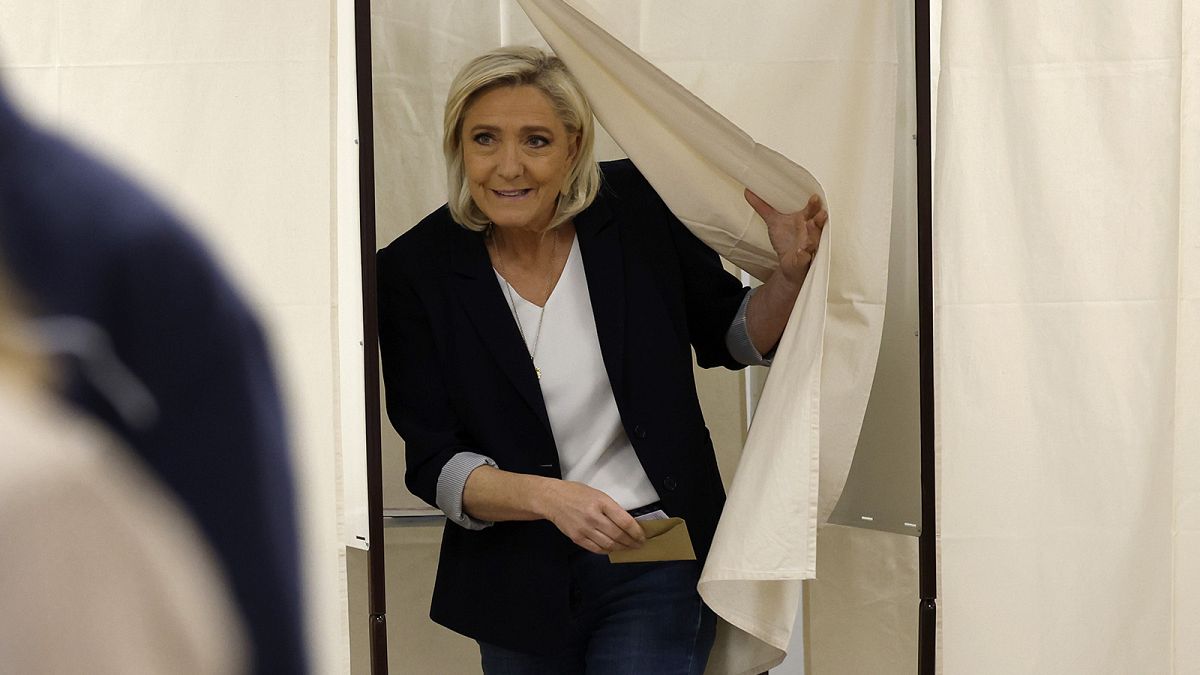The latest poll suggests a far-right majority can be blocked in parliament, with the National Rally falling short of the 289 seats needed to control the National Assembly.
French centrist and left-wing parties are trying to find a way to block a far-right majority in parliament — and a new poll shows that this is possible.
A Harris Interactive survey for Challenges magazine, the first since an anti-National Rally (RN) alliance was formed, indicates that Marine Le Pen’s far-right party might not win the 289 seats needed to control the 577-seat National Assembly.
According to this poll, efforts by President Emmanuel Macron’s centrists and the leftist bloc New Popular Front (NFP) to block the far-right as a so-called Republican Front (or Front Républicain) might be effective.
The forecast shows that the RN and its allies are likely to obtain between 190 and 220 seats. Meanwhile, the centre-right Republicans (LR) — who have allied with Le Pen — were projected to win between 30 and 50 seats.
This outcome would likely prevent the possibility of a far-right minority government supported by part of the LR parliamentary group.
‘Republican Front’ strategy
The poll followed the withdrawal of more than 200 candidates from various political parties who came in third in their constituencies in the first round, aiming to support the strongest candidate against the RN in the second round of voting on Sunday.
Prior to these withdrawals, polls had estimated that the RN was on track to win between 250 and 300 seats.
When asked by TF1 TV if she was concerned that the RN might fall short of the 289 seats needed for an absolute majority, Le Pen responded confidently, “No, I am very confident. French people have a real desire for change.”
According to the Harris poll, the NFP is projected to secure between 159 and 183 seats, while Macron’s Ensemble is expected to obtain only 110 to 135 seats.
Other parties are predicted to win between 17 and 31 seats.
What is the plan in the event of a hung parliament?
If the result of the second-round vote confirms the projected hung parliament, France will enter a period of turmoil with no single faction securing sufficient seats to form a government.
Incumbent French PM Gabriel Attal expressed optimism about the cross-party initiative to block a far-right majority, but he dismissed the notion of Ensemble forming a cross-party government in the event of a hung parliament.
Instead, he suggested that moderates would collaborate on legislation on an individual basis.
Sources from Macron’s cabinet say the president also ruled out forming a coalition with the far-left France Unbowed (LFI) party led by Jean-Luc Melenchon. It is unknown whether he discussed other coalition possibilities.
These remarks highlight that even if the RN fails to gain power, France may face prolonged political uncertainty until the next presidential election in 2027.
Le Pen willing to collaborate for absolute majority
Le Pen has indicated a willingness to collaborate with other parties if the RN does not achieve an absolute majority.
Her choice for prime minister, Jordan Bardella, has stated he would refuse to form a government without a clear mandate.
According to the survey, more than 4 out of 10 French people believe that none of these political parties will have an absolute majority in the National Assembly, while 35% believe that the National Rally will achieve it.
The survey was conducted online between 2 and 3 July, with 3,383 people representing the French population aged 18 and over taking part.
The quota method and adjustment were applied to the following variables: gender, age, socio-professional category, region, and previous electoral behaviour of the interviewee.

